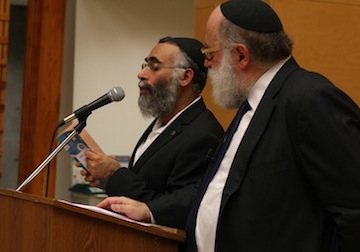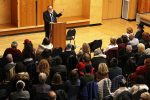Dear Yiddishkeit, I’m home! Did you miss me? Sorry I was away for so long. I got kind of lost in the desert. But I’m finally back, and living happily in … well, different places: at Ohel Ya’akov Community Kollel, at Chabad of Richmond and, recently, at the National Jewish Retreat in Palm Desert, Calif. (Not that other desert.)
I met your family, Chabad Lubavitch, about 13 years ago. They seemed authentic and sincere, and welcomed me warmly. I got the sense that they live what they preach: that every Jew is important and has a unique mission in life. This really resonates with me and makes me want to search for the mission that drives my life. Even though I’m not a Torah-observant Jew, your family treats me like one of their own. I don’t dress all that modestly, but I never feel judged by them. It’s funny, I grew up living a fairly secular life, yet I’ve never been more certain about where I belong, and that’s Chabad.
Oh, Yiddishkeit, I’ve admired you from afar for years. I know we haven’t always seen eye to eye on everything – you know, that Shabbos thing, the kosher thing. But there’s always been a chemistry between us. Even if it was unspoken. I have to admit, I’m enthralled; I want to know everything about you. Your likes and dislikes, your temperament, what you look for in a partner. I do know you’re a veritable buffet of fascinating facts and your family’s unabashed optimism and positivity inspires me beyond words. You and your family are smart, solid, attractive and respectful. How could I not love you?
So, how come we’ve played a game of “come here, go-away” most of my adult life? You were shy, yet inviting, all at once. And me? I was just non-committal. You never pushed me into anything though. You just waited me out until the time was right.
I remember in 1997 when one of your family – Rabbi Avraham Feigelstock – called me in the hospital when he found out I was very sick and had been there for 43 days. I’d never even met the man, and here he was calling me: “How are you feeling? Do you want a visit? Can I bring you anything? Let me give you my home and office phone numbers, in case you feel like talking.” I will always be grateful for that. I knew that there was more to this than mere friendliness.
After I recovered, I began going to weekly Friday night dinners and Saturday Shabbat services at the Kollel, where I met Rabbi Shmulik Yeshayahu. His Shabbat sermons jumpstarted something inside me that made me want to know you better. The Kollel is also where I met my bashert, Harvey. I owe you a lot, Yiddishkeit.
Until recently, I wasn’t even sure where I stood with you, Yiddishkeit. But now I know for a fact that I’m smitten. You swept me off my feet. And it only took 61 years! The turning point for me was last year at my retirement party, where another of your family members – Rabbi Yechiel Baitelman – gave a beautiful speech. He said: “Retirement doesn’t mean retiring from life. It means going on to do mitzvahs, and study and do good things.” This fanned the fire inside, and now I enjoy weekly Torah study classes at Chabad of Richmond and volunteer with the Light of Shabbat and Israel Connect programs. I have even attended the Jewish Learning Institute’s National Jewish Retreat. Twice! Rabbi Baitelman’s enthusiasm, encouragement and positivity are infectious.
But let me back up a bit. Early last year, I had a personal issue that was troubling me deeply and I needed someone to talk to. So, I asked Rabbi Baitelman if he could spare the time to speak with me. Long story short, we met at a Starbucks in Richmond and, for the next one-and-a-half hours, he looked directly at me and focused like I was the only person in the world who mattered. That, Yiddishkeit, made a huge impression on me. It reinforced everything I’d heard and read about Chabad – that they consider every Jew important and indispensable.
I once heard someone say, “We don’t choose Judaism. Judaism chooses us.” I am unspeakably honoured that you chose me, Yiddishkeit. I’m sure there are others much prettier, smarter and more devoted than I. Why me? You must have your reasons. Never mind.
All I know for certain is that you have given my life meaning and purpose. I’m more committed than ever to doing mitzvahs, studying Torah and learning about all things Jewish. What started as curiosity has blossomed into commitment. I regularly listen to Jewish scholars like rebbetzins Rivkah Slonim and Menucha Schochet and rabbis Moshe Bryski, Yitzchak Schochet, Y.Y. Jacobson, Mendel Kalmenson and others on Torah Café; and watch Rabbi Simon Jacobson’s videos from his Meaningful Life Centre. Books like The Secret of Chabad, Toward a Meaningful Life, My Rebbe, The 613 Mitzvot, The Empty Chair, The Rebbe’s Army, and books on davening, healing, Tanya, Shabbat and Jewish grieving have enriched my life unimaginably. One of the most life-changing events, though, was the National Jewish Retreat.
As I do more Jewish reading, I come across Yiddish and English adages that impress me with their profundity. It’s what I try to live by now. Check them out:
“Tracht gut, vet zein gut,” “Think good, and it will be good.” (Rebbe Menachem Mendel Schneerson of Lubavitch)
“Who is wise? One who learns from every man.” (Ben Zoma from Pirkei Avot, Ethics of the Fathers)
“Always remember: you are never given an obstacle you cannot overcome.” (Rebbe Nachman of Breslov)
“Gam zu l’tovah,” “This, too, is for good.” (Nahum Ish Gamzu)
My Jewish learning is like a prospector who shuffles the rocks around on his sieve, hoping to find gold. The more I infuse my life with Yiddishkeit, the more gold I find.
Let me declare, Yiddishkeit, in front of heaven and earth, that I commit, forever more, to being faithful, trusting and open to the love you give me. I promise not to squander or minimize it. I promise to hold you close and be there for you, like you are for me.
Fast forward. Hashem and I are now on a first name basis. We live together blissfully and share the chores. We hold each other up, and we’re true partners. I admire and adore you, Hashem. There is You and only You. Always.
Did I come to this love story overnight? Heck, no! It’s taken me decades of searching, questioning, losing and then finding myself. Yet, here I am – home. Where I’m meant to be.
My husband Harvey says there’s nothing quite as cloying as a convert. Even if it’s a Jewish-to-Jewish convert, like me. I’ve become a cheerleader for Yiddishkeit. Everything excites me, because it’s all so new. Learning to read Hebrew – let’s celebrate! Torah study class – break open the Manischewitz! Trying to keep Shabbat – woo-hoo!
I’m taking it all with baby steps. Nothing too drastic or radical, even though there are days I want nothing more than to totally immerse myself in Yiddishkeit. I’ve learned there’s no speeding up a process that has its own timetable. For now, lighting Shabbos candles, saying certain blessings, going to Torah classes and giving up certain foods is where I’m at.
At this point, I’ll slow dance with Yiddishkeit, keeping a respectful distance. And I won’t let anyone cut in. It’s just the two of us. The perfect shidduch!
Shelley Civkin recently retired as librarian and communications officer at Richmond Public Library. For 17 years, she wrote a weekly book review column for the Richmond Review, and currently writes a bi-weekly column about retirement for the Richmond News.



